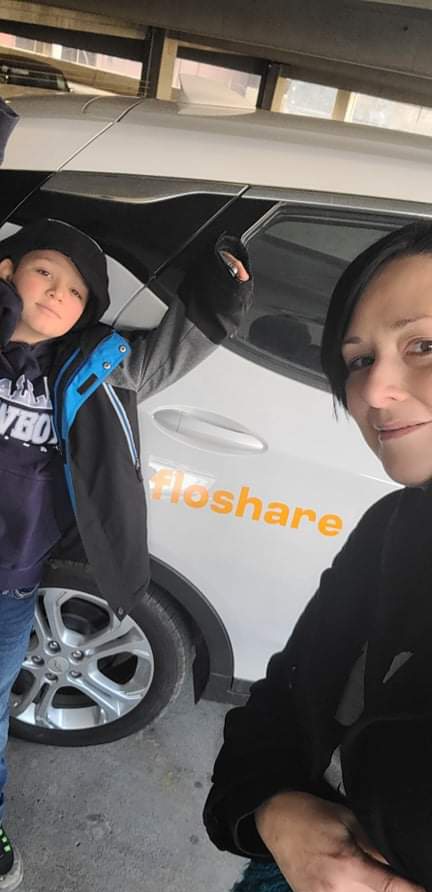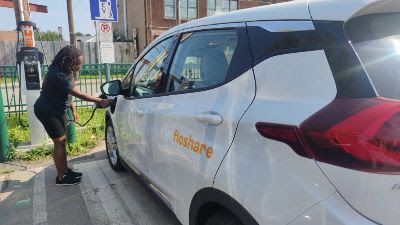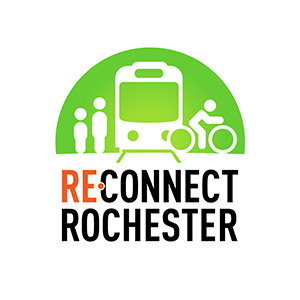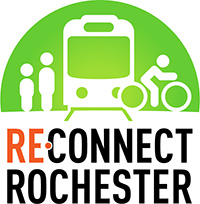Guest blog by Bree-Ana Dukes, Floshare Program Manager at Mobility Development Operations & Board Member at Reconnect Rochester
According to the 2018 Transportation and Poverty in Monroe County commissioned by Reconnect Rochester, “most households (88%) in Monroe County have access to a vehicle (74% in Rochester). This leaves 12% of households in the county (35,000 households), and 26% of households in the city (22,000 households) without access to a vehicle,” about a third of all city of Rochester households.
Flower City Carshare (Floshare) is a partnership between Mobility Development Operations (MDO) and the City of Rochester and is the first electric vehicle (EV) car sharing program in New York. The carsharing program targets chronically economically distressed areas and neighborhoods where there are low rates of car ownership.

“We had a BLAST with the car. My son told everyone everywhere we went that the car we were driving was ‘TOTALLY ELECTRIC MAN.’ Thanks again for helping me get this started, I cannot wait to rent it again.” (Rachael Boelens)
The lack of electric vehicle supply equipment (EVSE) in many of Rochester’s neighborhoods echoes the historical disenfranchisement of marginalized communities and the disparities that have resulted from centuries of disinvestment. Carsharing services alone cannot solve the systemic issues around transportation for the poorest segments of the City’s population, but community-controlled EV carsharing will add a new mobility option to the transportation landscape for those without access to a personal vehicle. Through intentional collaboration with community based organizations, the transportation sector, and social service agencies addressing these EVSE gaps, Floshare hopes to better connect residents to the city and surrounding areas.
Carsharing means community residents have access to a network of electric vehicles located in close proximity to them everyday of the year at any time of the day. This certainly won’t solve our transportation issues, but while funding is on the table we have to consider the lack of car ownership and how marginalized communities are able to benefit from the EV movement from an economic, social, and public health perspective. Much can be debated about the state of transportation within Monroe County, but the fact is that accessibility is not equal for those historically disenfranchised, specifically, for Black and Indigenous people of color.
Targeting EV Investment to the Disenfranchised
Electric Vehicle (EV) charging stations are a huge topic of national conversation following the Biden-Harris Administration’s release of the National Electric Vehicle Infrastructure (NEVI) Formula Program Guidance. States will be responsible for allocating $5 billion toward electric vehicle charging infrastructure with the goal to “put the United States on a path to a nationwide network of 500,000 EV chargers by 2030 and ensure a convenient, reliable, affordable, and equitable charging experience for all users.”
The Administration’s Justice 40 initiative commits to allocate at least 40% of all funding and investments to “disadvantaged communities”. This is an important distinction because history has shown that without intentional investment in marginalized communities, subpar or disinvestment will continue to widen the racial inequality gap. Some opponents to this commitment will cite the lack of EV ownership as a reason to not invest in marginalized communities, but that is precisely why it is important to do so. Arguments about whether certain communities deserve targeted investments are tired! It is this type of rhetoric that continually blocks BIPOC from opportunities to benefit from social and economic development and revitalization.
A conversation that would be more productive is one that acknowledges the root causes of “carless” homes as well as the inability to afford an EV as outcomes of systemic racism. Centuries of genocide, slavery, Black Codes, Jim Crow, redlining, and a host of other discrimanatory acts continue to plague our organizations and institutions of governance. So, we must never forget what’s ever present in the zeitgeist that makes commitments like Justice 40 necessary.
Sign Up for Floshare’s Expanding System in ROC
The Floshare program provides access to fully electric vehicles and charging infrastructure for a low cost rate of $5/hour or $40/day. The program has been beta testing since September 2021, with locations at the Rochester Public Market and St. Mary’s Campus and more locations coming soon! About two dozen residents have gone through orientation to test the vehicles and its technology, in preparation for a launch event this summer. Anyone who is interested is encouraged to sign up by downloading the Miocar Networks app.



You’ll probably see my name in a number of places. I have been trying to contact you to learn more about car sharing.